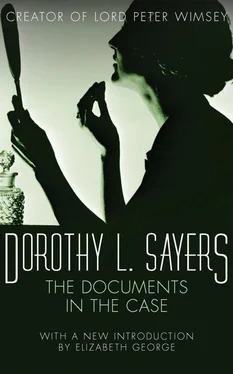I need not say how distressing they were to me. They cast a light upon the miserable domestic conditions which my father had had to endure. I regretted most bitterly that I had taken over that work in Central Africa, thus leaving him to the undiluted companionship of a selfish, discontented wife and a semi-demented and vulgar woman. My father was not a man to go abroad for the sympathy he could not find at home, and it was no wonder that he had welcomed the acquaintanceship of two young men who could, at least, make some pretence of entering into his interests.
But the thing which emerged from the letters with startling illumination was the intimate footing upon which Lathom had stood with the whole household. As may be seen by the few letters included above, my father was by no means a gossipy correspondent, and I had not realised that Lathom had become so much of a tame cat about the drawing-room. I had thought of him as being my father’s friend almost entirely, and I believe that my father himself took that view, and, wittingly or unwittingly, gave me that impression. But it now seemed clear to me that this was not so, and that, what with my father’s innocent pleasure in the apparent admiration and friendliness of this brilliant young man, and what with the perverse misconception of the wretched Agatha Milsom, we had all been ‘led up the garden’, as the expression is.
I saw now why both Lathom and Munting, standing by one another in a conspiracy of silence, had been able to deny with such obvious sincerity that there had ever been an undue intimacy between Munting and Margaret Harrison. Lathom had said that my father’s last days had been free from suspicion; I saw now that this was possible. I also saw why Lathom had been so unwilling that I should ask Munting the same question, and why Munting had referred me back to Lathom for the answer. Munting must, I thought, be considered clear of any offence except a refusal to betray his friend’s confidence; and I was obliged to confess that most people would think he had acted rightly. Lathom, too, had kept to the code of what is usually called honour in these matters. As for Margaret Harrison — but from her I had never expected anything but lies.
But if this was the truth, why should my father have committed suicide? For I still do not believe in the theory of accident. Either something must have opened his eyes during Lathom’s visit to town, or else that other, darker suspicion, which I had hardly liked to glance at, was only too well-founded.
I am a business man. I have the business man’s liking for facts. To me, an expert’s knowledge is a fact. Experts occasionally make mistakes, but to me it appears far less probable that an expert should be mistaken than that an artist and a woman should be unprincipled. And I cannot make it too clear that my father’s expert knowledge in the matter of fungi was to be trusted. I would as cheerfully stake my life on the wholesomeness of a dish prepared by my father as on the stability of a girder-stress calculated by my chief, Sir Maurice Berkeley. But I would not venture a five-pound note on the honesty and virtue of such people as Lathom and Margaret Harrison.
But to prove the truth of my suspicions, I needed more facts — the sort of facts that a jury would accept. To them, my father’s knowledge of fungi would not be a fact at all.
I turned the matter over in my mind, and eventually came to the conclusion that, whether I liked it or not, I must see the woman Cutts. I hoped that she would come to me, but several days passed and I saw nothing of her. Either the creature had no facts to sell, or she was holding off in the hope of securing better terms. I saw through her artifice well enough, but I saw also that she had me at a disadvantage. Eventually, and with great reluctance, I wrote to her as follows, addressing the letter to Lathom’s studio.
‘Mrs Cutts — Madam, — When I saw you the other morning at Mr Lathom’s studio, you suggested you might be in a position to do some work for me. I shall possibly be requiring some assistance of this kind in the near future, and shall be obliged if you would call on me one evening at my hotel to discuss the matter.’
On the second day after dispatching this, I was informed that a lad was waiting downstairs to see me. I went down and found a ferrety-eyed youth, who introduced himself as Archie Cutts.
‘Oh, yes,’ I said, ‘you have come about the work I mentioned to your mother.’
‘Yes, sir,’ he replied. ‘Mother says as she can’t bring it ’ere, not ’avin’ the tools by ’er, but if you was to come down to our place on Friday, the party as she obliges bein’ out that night, she would be willing to make an arrangement.’
This was disagreeable.
‘If I am to take that trouble,’ said I, ‘I shall want to know, first, whether your mother is likely to be able to do what I want.’
He looked cunningly at me with his shifty eyes.
‘Mother says she could show you letters from a lady as you know very well, only she won’t trust ’em to me, bein’ valuable to ’er and not wantin’ to lose ’em.’
‘Oh, I see,’ said I, loudly, ‘testimonials, eh? Letters of recommendation. I see. And your mother thinks she understands what is required and would be able to give satisfaction?’
‘Yes, sir.’
‘Did she say anything about terms?’
‘She says she’ll leave that to you, sir, w’en you see the work.’
‘Very well.’ There was nothing to be got by argument. ‘Tell your mother I will try and find time to call on her on Friday evening.’
‘Yes, sir. Nine o’clock would suit mother best.’
I made the appointment for nine, and gave the lad a shilling for his trouble. At nine o’clock on the Friday evening I found myself knocking at a dilapidated door in the long drab street of very squalid houses. The ferret-eyed lad let me in, and I saw, with considerable repulsion, my former acquaintance, seated in some pomp at a round table, containing a lamp, a wool mat and a family Bible.
She greeted me with a condescending nod, and the youth withdrew.
‘Well, now,’ I said, ‘Mrs Cutts, you have asked me to come and see you, and I hope you are not wasting my time, because I am a very busy man.’
This forlorn effort to establish my dignity made no impression on her.
‘That’s for you to say, sir,’ said she. ‘I wasn’t for intrudin’ on you. I am a respectable woman, thank God, and can maintain myself in my station by ’ard work, and never ’ad no complaints. Not but wot I’d be willin’ to oblige a gentleman if ’e was requirin’ my services, not bein’ too proud to do a favour.’
‘Quite so,’ said I, ‘and if you can do the work I want, I will see that it is made worth your while.’
‘Wot sort of work was you thinkin’ of, sir?’
‘I gathered from what you said to me,’ I answered, ‘that you thought you might be able to throw some light on the circumstances of my father’s death.’
‘That’s as may be. There’s ways and ways of dyin’. Some is took, and some takes French leave, and others is ’elped out of life, ain’t they, sir?’
‘Have you got any information to show that my father was helped out of life?’
‘Well, there, sir. I wouldn’t go for to say sech a thing — nor yet for to deny it, ’uman nature bein’ that wicked as you can see for yourself any Sunday in the News of the World . But wot I says is, w’en persons is wicked enough to ’ave goin’s on be’ind a gentleman’s back, there’s no knowin’ wot may come of it, is there?’
‘You said you had letters to show me.’
‘Ah!’ she nodded. ‘There’s good readin’ in letters sometimes, sir. There’s letters as would be worth ’undreds of pounds in a court of law, to some people as one might name.’
Читать дальше












